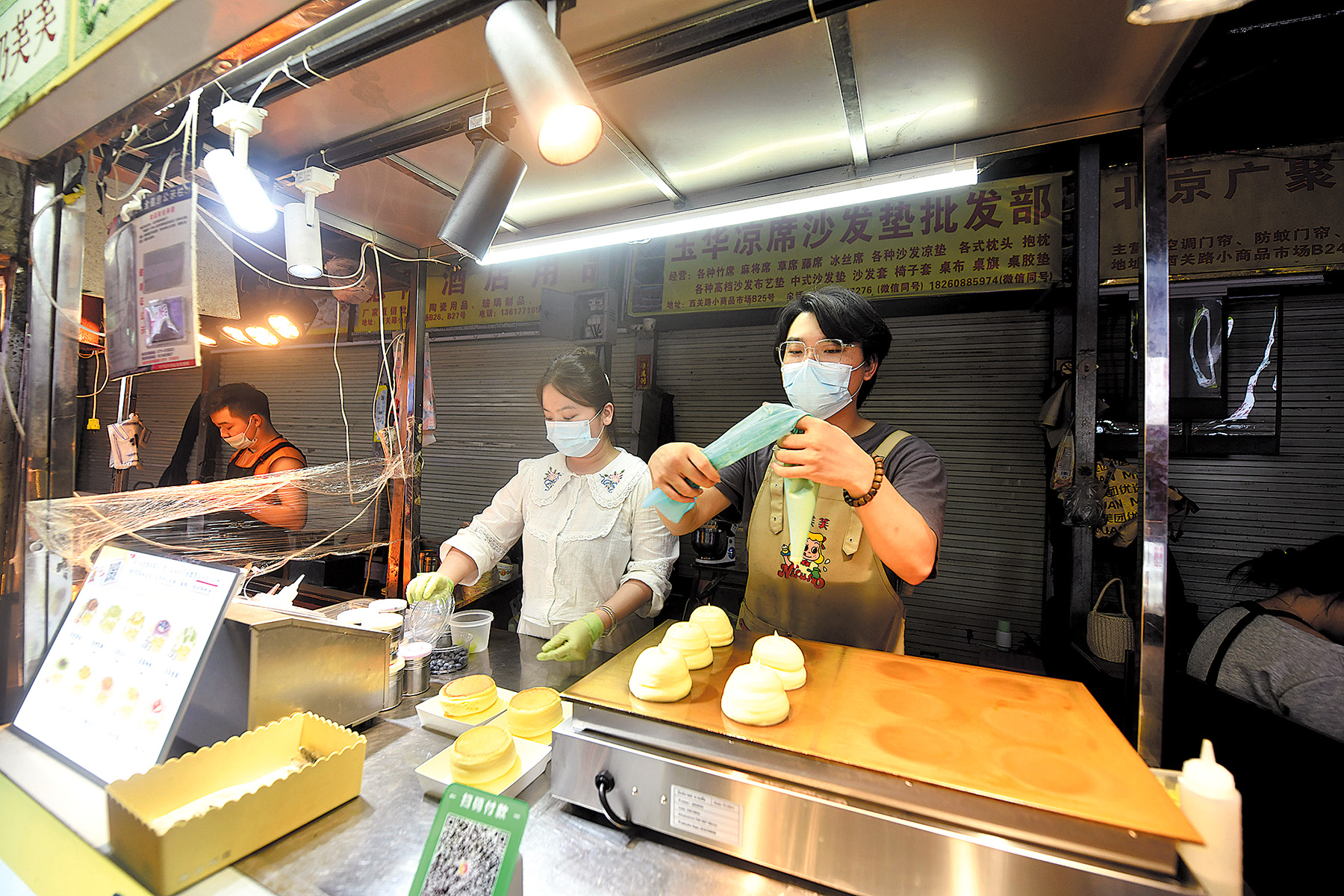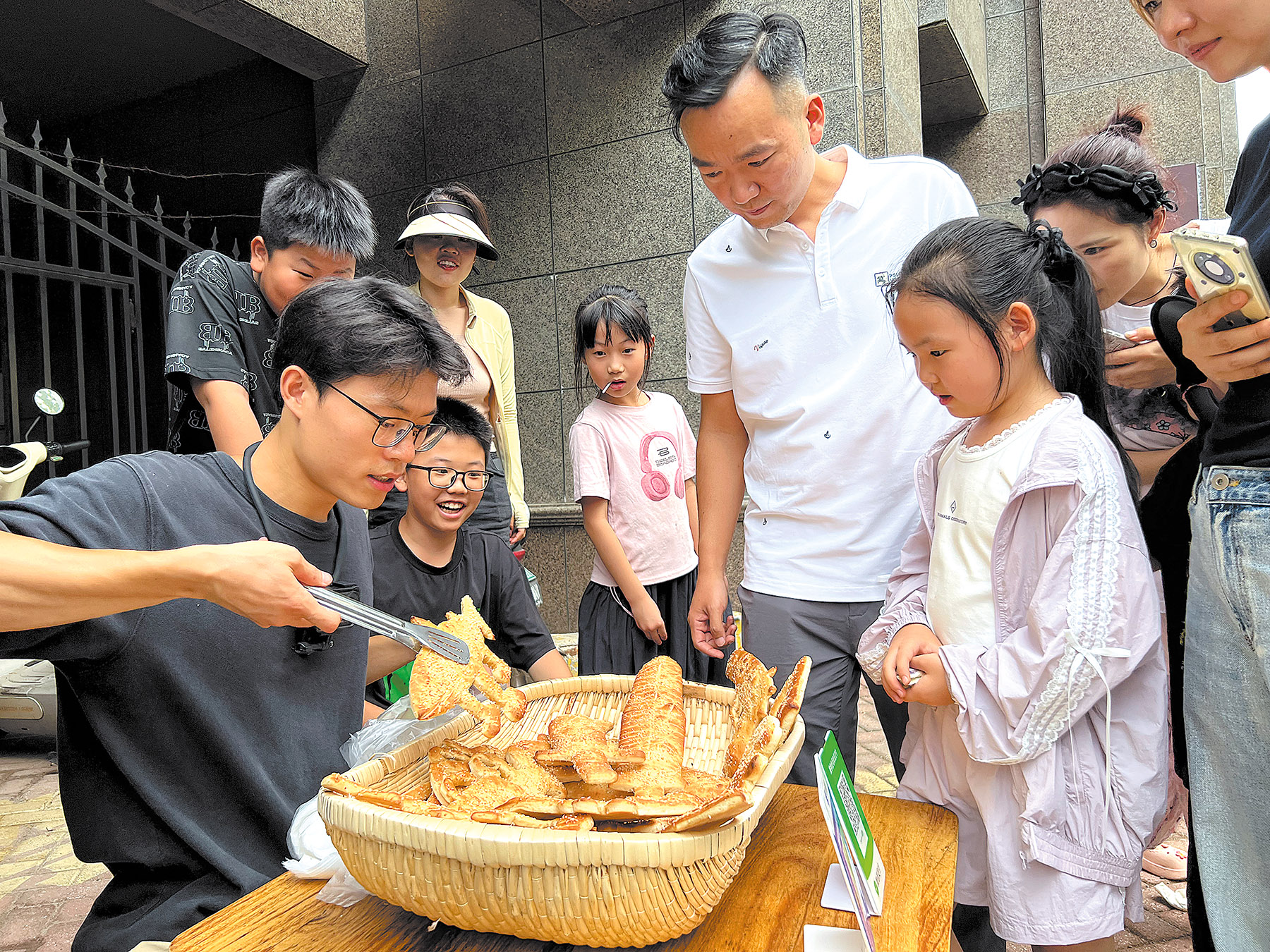With tough competition remaining in the job market, degree holders sniff out new ways to earn a crust

The first time Wu Yun'e had to greet customers at a Chef Fei restaurant, the words caught in his throat.
Fresh out of college with a bachelor's degree in internet of things engineering from Hunan Agricultural University, standing in his server's uniform, the simple "Hello" felt impossibly heavy.
"My voice was barely a whisper, like a wisp of silk," said Wu, now 25 and the head of a Chef Fei branch in Zhengzhou, Henan province. "It took me a solid week to say it loud and clear." His journey — from grappling with social anxiety to managing an entire restaurant within two years — starkly contrasts with the traditional path expected of a university graduate.
Wu's story has become familiar to many graduates unable to find careers in their chosen fields, and who are turning to professions in other industries.
READ MORE: China takes multi-pronged measures to boost graduate employment
When presenting the franchise's signature Hunan-style stir-fried pork with pepper dish, servers are required to introduce the dish to customers by saying: "Hello, hello, here is the signature stir-fried pork with pepper by Chef Fei, the king of the dish in the country." However, Wu was also unable to say the sentence fluently.
"My face turned completely red, to the point that the customers felt bad for me," he said.
However, as his peers were able to recite the sentence quickly and confidently, Wu's competitive side kicked in, and he practiced the mantra countless times until it became muscle memory.
Because of his competitiveness, curiosity and willingness to venture into unknown territory and learn new things, he was promoted to the head of a branch in May.
Apart from learning how to be a proper server, he also learned about accounting, human resources, cost management, restaurant operations and how to cook that signature dish of stir-fried pork with pepper.

In a similar situation to Wu, Xiao Yang, a 27-year-old civil engineering master's graduate from a university in Henan, now crafts whimsical flatbreads shaped to look like video game and cartoon characters. He sells them from a stall near a primary school in Zhengzhou.
After leaving a brief, unsatisfying job teaching physics not long after graduation, Yang discovered his talent on an idle griddle in his father's restaurant. By manipulating the dough and pan, he was able to fashion a wide range of flatbreads in amusing shapes that quickly caught on with local children.
"Seeing the kids so happy gave me a sense of accomplishment, and that motivated me to keep going," Yang said, adding that he sells around 20-30 flatbreads daily.
His unexpected popularity spilled onto short-video platform Douyin, where he quickly amassed over 160,000 followers captivated by the quirky breads and his interactions with the kids.
For Yang, his degree hasn't been wasted; it's a tool applicable to any job, he said. "It's not embarrassing. Doing something well proves that education helps every job."
Similarly, Wang Jinwei, 26, a graduate from Chaohu College, Anhui province, diverted from his expected career path to becoming a secondhand mobile phone trader in Dongguan, Guangdong province.
His business involves buying used phones in bulk by weight, meticulously sorting them by brand, components and condition, then supplying vendors in Huaqiangbei, one of the world's largest electronics markets, in Shenzhen.
His monthly intake fluctuates wildly, collecting anywhere from 1,000 to 5,000 phones, and with profit swinging from 30,000 to 50,000 yuan ($4,200 to $7,000), to losses, demanding constant adaptation.
"Entrepreneurship has risks, and investment needs caution," said Wang, describing the paralyzing anxiety during slow periods as "facing a wall in front while a force pushes you from behind".
While acknowledging the grueling hours, often 10-plus daily, Wang values the autonomy. "The key difference is being a robot following orders versus life pushing you ... I enjoy the freedom," he said.

Wang admits his path, chosen impulsively for perceived greater opportunity, wasn't the most prudent. "If I went back, I'd probably find a job first and gain experience," he said. Yet, he finds no inherent waste in his degree for his current trade.
Almost 12 million people graduated from college in China last year, and the country's graduate job market remains highly competitive, meaning that some graduates have to diversify their options in the search for an income.
Tang Daisheng, a professor at the School of Economics and Management at Beijing Jiaotong University, said the reasons for more college graduates to choose blue-collar work include intense white-collar competition juxtaposed with the rise of flexible, digital-platform-enabled blue-collar opportunities offering tangible benefits.
According to reports on the salaries for blue-collar workers for last year, the monthly income of delivery riders on average was 7,496 yuan, significantly higher than the average starting salary of 5,438 yuan for new graduates, Tang said.
Some young graduates are prioritizing practical income, hands-on experience and personal growth over the fading allure of purely respectable desk jobs, he said.
Cai Zhenhua, an associate professor at Xiangtan University's School of Public Administration, said it has become a rational choice within broader societal shifts. "Blue-collar work itself is evolving, infused with more technical and creative elements due to digitalization and industrial upgrades, creating novel roles demanding both knowledge and skill," he said.
Cai said that graduates are actively tearing off the old label of "degree equals identity", challenging stigma around manual labor and redefining the relationship between knowledge and work.
Social media has played a key role in normalizing and exploring this trend, with videos and posts by graduates detailing their blue-collar experiences attracting a lot of engagement.
Cai attributes this to a mix of novelty and genuine societal introspection.
When college graduates are doing any job that can make money, their stories break the stereotype of prioritizing educational backgrounds in finding jobs, and offer alternative choices for other graduates amid a slowing economy, he said.
Naturally, criticism persists. Some people label these choices as a waste of education, or even "squandered national resources". Both professors counter these views.

Tang said this critique stems from an outdated, narrow view of education's purpose and the nature of modern blue-collar work. "The core of higher education cultivates thinking skills and logical abilities, not professional labels," he said.
He cited Ministry of Human Resources and Social Security data showing college graduates in "new blue-collar" roles, such as those in smart logistics, had boosted industry efficiency by 23 percentage points.
Drawing parallels to Germany's "dual system" for vocational education, Tang said that high-quality talent is vital for industrial advancement.
"When college students use drones to inspect circuits or provide bilingual services to communities with large numbers of foreigners, they are redefining 'degree value' — it's not a framed diploma gathering dust, but the spark of knowledge that illuminates every position," said Tang.
Cai deems the "wasted education" accusation as being misjudged, rooted in a vague understanding of higher education goals and outdated perceptions of occupational evolution.
Blue-collar roles such as smart machinery operators, maintenance engineers and computer numerical control machine tool debuggers now command average salaries of around 12,000 yuan, surpassing many entry-level white-collar positions — a testament to the reshaping of professional value driven by digitalization and AI, Cai said.
He referenced Germany's experience, where precision mechanics from vocational schools often outcompete university graduates, underscoring the need for China to abandon a "degree-only mentality" and embrace a system based on competency.
ALSO READ: Action taken to settle job market
"The master craftsmen enabling high-speed rail and the engineers designing it deserve equal respect," Tang said.
Cai added that top blue-collar roles demand systemic thinking, problem-solving and craftsmanship that rival knowledge work. The boundary between white-collar and blue-collar is blurring, he said.
Individual choice, he stressed, should be guided by forward-looking insight into industry trends, clear self-awareness of interests, and rational analysis of career paths, not outdated prestige. "The real 'iron rice bowl' is not a whitecollar or blue-collar job, but the irreplaceability of the workers themselves," Cai said.
Tang said both white-collar and blue-collar jobs are indispensable for the functioning of society. Developing respect for every form of work and career choice is an important step to building a fair and inclusive society.
Zhang Wanbo contributed to the story.
Contact the writers at zoushuo@chinadaily.com.cn


